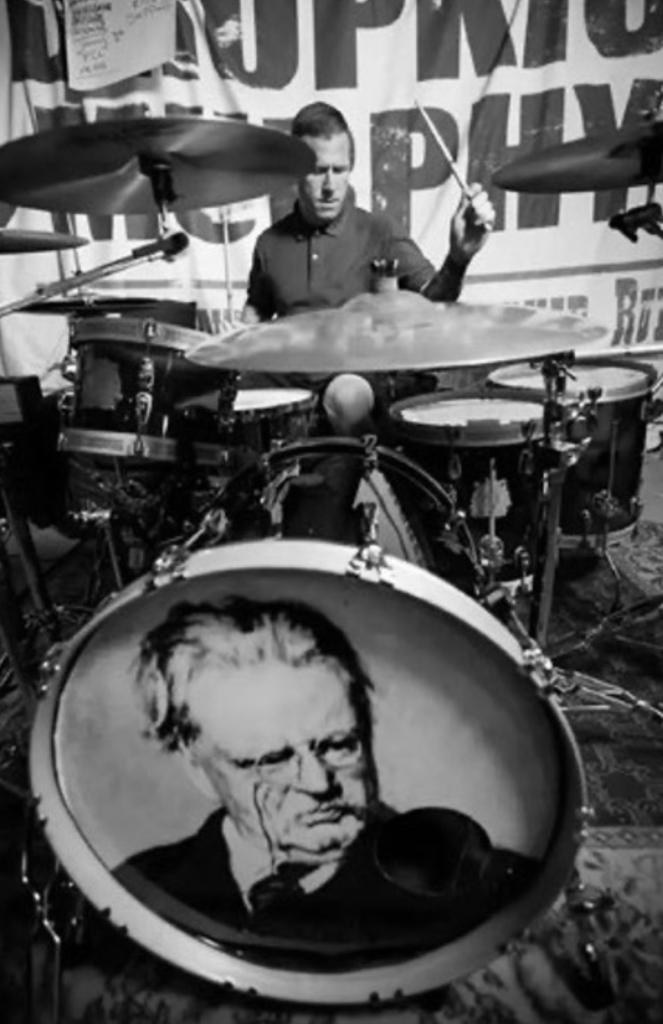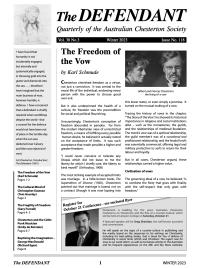
Chesterton has always earned admiration in unexpected quarters. One of the most unexpected is his effect on Matthew Kelly, a drummer in the American-Irish Punk band, Dropkick Murphys. Very popular with their Boston hometown fans, the band gained worldwide recognition for their Platinum-selling single “I’m Shipping Up To Boston,” featured in the 2006 Academy-Award winning movie, The Departed.
Matthew Kelly’s discovery of Chesterton renewed his Catholic faith and opened his mind to the metaphysical, as explained in this interview with Emily de Rotstein, Executive Director at The Society of Gilbert Keith Chesterton. The interview first appeared in the January-February 2023 issue of the Society’s journal, Gilbert, and is reprinted with its kind permission.
GM: Do you still have the image of GKC on your bass drum?
MK: Oddly, I have two drum kits, both having had GKC’s image on them … the one in the USA has unfortunately been upended by an image of Woody Guthrie, as my band has recently released an album featuring his until-now unpublished lyrics. I hope to return Mr. Chesterton’s image to its rightful place as soon as I can! Chesterton’s face is still on my bass drum in Europe, and we’ll see how long that lasts.
GM: Tell us about your background and professional career.
MK: I was a poor kid from Central Massachusetts who grew up surrounded by a family of musicians, philosophers, and athletes. I started drumming at the age of nine, to the joy of my father and my Uncle Mike, who are both drummers. I joined my first band at the age of twelve, and have been playing out ever since.
I joined the Dropkick Murphys in 1997, and that’s pretty much it. I never attended college, so I’m pretty useless unless you need a drummer!
GM: Were you raised in a religious family?
MK: Both sides of my family are Catholic. I remember my maternal grandfather lectoring at Mass on Sundays; he and my grandmother were very pious Catholics. Most of my dad’s uncles were philosophers, some very familiar with Chesterton, Hilaire Belloc, and their ilk. One of our aunts was a nun many years ago, but followed the vocation of married life. Also, we had an uncle in seminary for a while, but also ended up getting married, too. My paternal grandmother went to Mass daily until she was about 84 and a series of strokes took the wind out of her sails.
As far as my immediate family, while growing up my siblings and I attended a Catholic parochial elementary school. For a long time, we attended Mass regularly, but things faded a bit as we got older. I stayed interested in the Church and Christianity in general, but my teen years saw a lot of secular influences and disinterest in spiritual life.
GM: How did you first encounter G.K. Chesterton?
MK: Oddly enough, it was while reading the liner notes to an Iron Maiden LP! Their song “Revelations” uses Chesterton’s “O God of Earth and Altar” hymn as the first verse.
Matthew Kelly
The Maiden boys, being good lads, credited the lyric to G.K. Chesterton. The name wasn’t familiar to me, so I used the double-edged sword that is the internet and did a bit of research. I noticed that he was a hero to my favorite writer, J.R.R. Tolkien, as well as C.S. Lewis, among others, and that he was Catholic. Sounded good to me. So I looked him up on a well-known book distributor online, and the first book that came up was Common Sense 101, by your own Dale Ahlquist!
GM: How did Chesterton play a role in your faith journey?
MK: Chesterton sort of “connected the dots” for me between faith and reason. I always read the Stoics like Aurelius, Epictetus, and Heraclitus, and I had been a “half-arsed” Catholic (I believed but didn’t participate much), without attending Mass regularly or receiving the sacraments … I just didn’t know why I believed.
Reading Common Sense 101 and then Orthodoxy transformed my “philosophical journey” into a “theological journey,” and looking into the writings of the Church Fathers, as well as more recent and contemporary writers. It brought me into a much, much deeper understanding of the scriptural basis of the sacraments, and the reason for the traditions in the Catholic Church. It kind of opened my eyes to ponder the metaphysical as much as the visible and physical.
GM: What is your favorite work by G.K. Chesterton?
MK: Tough question! As far as fiction, I love The Man Who Was Thursday and The Ball and the Cross. But for apologetics it’s got to be Orthodoxy. However, I love Chesterton’s poetry, especially Lepanto. What an absolute masterpiece! I usually have a book or two of his in circulation.
GM: Do you have a favorite quote by GKC?
MK: A favorite quote from the most quoted man of the twentieth century? Hmmmm, it’s hard to pick just one … “A dead thing goes with the stream, but only a living thing can go against it” is one that comes up a lot in my thoughts and in dealing with the things life throws at me.
GM: You’ve mentioned you’re a fan of classical education. Please tell us more about that.
MK: I think the Trivium is a hugely important (and now widely-neglected) aspect of a child’s development. It was the basis on which a solid classical education was built. A classical education is what grounds a student in the fullness of reality; showing how these subjects complement each other forms a proper understanding of life.
Being an autodidact, I had to do part of my personal (and paltry) education myself, and I’m still learning!
GM: Chesterton Academy students are required to sing in the choir all four years, and study music history each year. What do you think about requiring music for high school students?
MK: Music is a language. Knowing a language other than your own helps you understand the world that much better… Granted, I suppose I’m biased, but I think it’s an important part of a child’s development. The creative aspect of music as well as the theory aspect massage both the left and right brain.
As far as compulsory parts of high school education, music could be one of the things that jaded teens might look forward to in their daily life. Hey, they could, and some do, waste their time studying things a lot less savory.
GM: What are your preferences on Catholic liturgical music? Any thoughts on the role of music in the church today?
MK: I prefer traditional Church music in the liturgy. I believe that just as we conduct ourselves and dress in a reverent manner when we go to Mass, we should also have music to reflect that, oriented vertically, ad orientam, towards God.
Rock music, to me, is oriented horizontally. It’s strictly entertainment. I love rock and roll music, and jazz, etc., but they’re forms of entertainment, and they draw the eye and attention towards the performers. We as Catholics are asked that while we live IN this world, we shouldn’t be OF the world. What other place on earth should that phrase ring true but in the presence of the Eucharist?
The music in church should be set apart, as a break from “the World,” so we can focus on the fact that we’re receiving Christ’s body and blood, and this isn’t some kind of casual party.
GM: Why do you believe Chesterton is relevant for the world today?
MK: I think that he had a keen eye for what was wrong with the world he lived in. The people who lived millennia before him, and we who live after his passing, are all flawed souls. There always have been and always will be well- intentioned people with bad ideas, and sometimes just bad people. Most of the world’s problems stem from the flawed nature of human persons. Chesterton pointed these things out with a laser focus, and the innocence, humor, and joy with which he went about it is an example to us all of how Christ asked us to live.
The beauty of GKC’s writings is that he wrote on such a myriad of subjects, there’s something for everyone… and the more one reads Chesterton, I think the more one comes to finding the keys to the Truth. It’s like he’s chuckling and pointing at that door … and we just need to walk through it.
